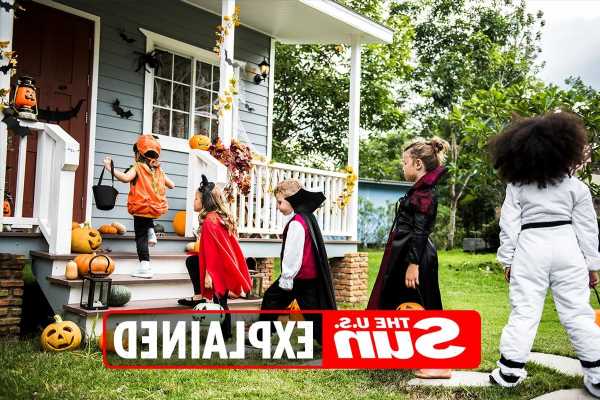
When did trick or treating first start, what is the meaning behind the phrase and how does it vary around the world?
10/31/2021OCTOBER 31, is known as one of the spookiest night of the year in America.
It is also the same time that many dress up in costumes and go trick or treating with friends and family to celebrate the holiday.
Where did Halloween come from?
While many believe Halloween was originated in America, the holiday is said to be linked to Ireland, where the Celtics celebrated Samhain.
The spooky festival is said to have been one of four Gaelic seasonal festivals that were observed across Ireland, Scotland and the Isle of Man.
Other theories also suggest that pagans have been celebrating Halloween for thousands of years, where people dressed up in costumes and built bonfires to scare evil spirits away.
Remarkably, evidence of these early Halloween events can be traced back to over 6,000 years ago.
What's the history of trick or treating?
On the holiday, it is not uncommon for children to go trick or treating throughout their neighborhood.
Trick or treating may seem like a modern event, but it can actually be traced back to Celtic Britain and Ireland in the 9th century.
The night of October 31 was known as Samhain, a Pagan festival which was later combined with Christian celebrations and renamed All Saints' Day by the Catholic church.
At Samhain, our Pagan ancestors believed the souls of our dead came into our world – and were appeased by offerings of food and drink.
It's believed that trick or treating evolved from a ritual where people dressed as ghosts and demons, performed dances around a bonfire and received treats to appease the evil spirits.
This practice, known as mumming, dates back to the Middle Ages.
By the time Christianity had spread into Britain, a new practice called souling had developed.
Poor people would visit the houses of the rich and receive pastries called soul cakes, in exchange for promises to pray for the homeowners' dead relatives.
In Scotland and Ireland, meanwhile, young people would visit their neighbors' houses and sing a song, recite a poem or perform another sort of 'trick' before receiving a treat of nuts, fruit or coins.
What's the meaning behind the phrase trick or treating?
The term trick or treating wasn't used until the 1920s, when it was adopted in America.
The first mention of trick or treating in print was on November 4 1927, according to Today I Found Out.
Discussing the town's Halloween meeting, a Canadian journalist wrote: "The youthful tormentors were at back door and front demanding edible plunder by the word 'trick or treat,' to which the inmates gladly responded and sent the robbers away rejoicing."
But adults weren't too happy about being forced to hand out sweets, under the threat of a trick, when this first started – and saw it more as an offer they couldn't refuse.
Nowadays, it is one of America's biggest traditions, where people will go from door-to-door with Halloween buckets, asking for sweets from their neighbors between 5:30 and 9:30pm.
How is Halloween celebrated around the world?
While Halloween may be associated with trick or treating, costumes and candy, the holiday is celebrated different around the world.
Mexico
In Mexico, Halloween is celebrated with a three-day celebration that begins on October 31.
This celebration is called All Souls’ Day, and is known as a celebration to honor the dead, who are believed in their culture to return to their earthly homes during this time.
In honor of the celebration, they decorate their homes with candy, flowers, photographs and food.
They also light candles and incense to help their spirits find their way home.
England
In Europe, Halloween is typically celebrated on November 5, when bonfires are lit throughout the country.
Their Halloween is known as Guy Fawkes Day, also known as Bonfire Night and Fireworks Night.
Despite it being around the same time and having similar traditions, the night is not typically associated with Halloween because of Martin Luther’s Protestant Reformation.
The festivities are designed to "commemorate the execution of a notorious English traitor, Guy Fawkes," according to History.com.
America
In America, Halloween is known as one of the biggest nights of the year.
Across the country, people dress up in costumes and tell stories stories of ghosts and witches.
They also carve pumpkins into jack-o'-lanterns and go door to door trick or treating.
Source: Read Full Article



